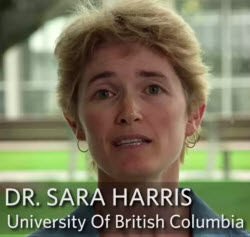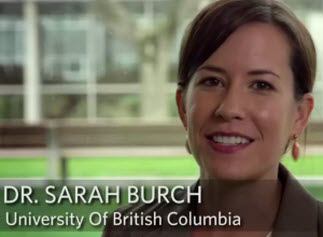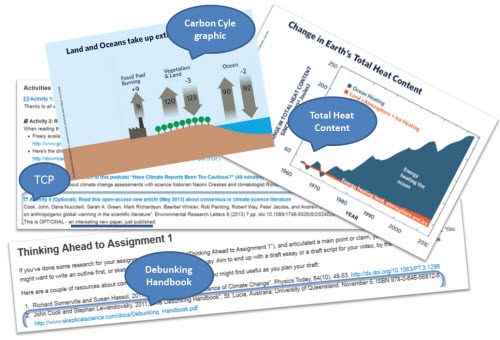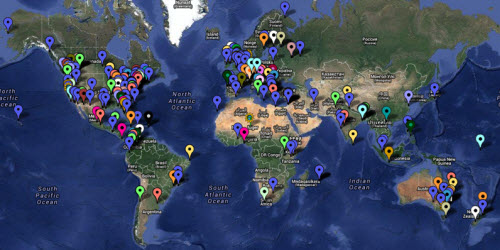Where SkS-Material gets used - Coursera's Climate Literacy Course
Posted on 2 August 2013 by BaerbelW
On May 17, 2013 'Climate Literacy' - a MOOC (massive open online course) offered from the University of British Columbia (UBC) via the Coursera platform - kicked off with a first email from the instructors Dr. Sara Harris and Dr. Sarah Burch:
"Welcome to Climate Literacy: Navigating Climate Change Conversations. You are among thousands of students from around the world currently registered for this course. Climate Literacy offers an unparalleled opportunity to have a meaningful, informed conversation about climate change. Despite the shifting winds of public opinion and intricate political machinations, it’s hard to miss the ongoing conversation surrounding climate change. Stories are emerging from around the globe: rising sea levels and eroding coral islands in the Maldives; increasing hurricane activity affecting the U.S. eastern seaboard and Gulf coast; drought in central Africa; declining amphibian populations in the Amazon. …."
What followed has been an excellent example of how these types of online courses should be done:
- Professionally produced videos with the instructors addressing us - the students - directly
- Presented by two engaging instructors who clearly put a lot of effort into this first iteration of the course
- Accompanying materials like video-transcripts and slides made available for download
- Clearly structured overall course layout with outlines for each weekly module made available on Fridays
- Reasonable deadlines to turn in course work
Over the course of 10 weeks, we tackled the various aspects of climate change in modules called 'The Conversation', 'Climate System', 'Energy', 'Carbon', 'Models', 'Future Climate', 'Impacts', 'Mitigation', 'Adaptation' and 'Taking Action'. The first 6 modules were presented by Dr. Sara Harris who teaches global climate change, environmental science, and oceanography in the department of Earth, Ocean, and Atmospheric Sciences at the University of British Columbia. She has a PhD in Oceanography from Oregon State University and a research background in paleoceanography and paleoclimate. With module 7, Dr. Sarah Burch took over. She is Assistant Professor of Climate and Society at the University of Waterloo, but co-created the course during her time as a Banting Postdoctoral Research Fellow at UBC. She has a PhD in Resource Management and Environmental Studies from UBC and focuses on climate change and sustainability governance.


Throughout the course, SkS-material popped up either directly in the lectures or referenced in the reading materials of the modules:

By chance, our TCP-paper had been published the week before the course started and the instructors added it to the module 1 activities:
"Activity 4 (Optional): Read this open-access new article (May 2013) about consensus in climate science literature
Cook, John, Dana Nuccitelli, Sarah A. Green, Mark Richardson, Baerbel Winkler, Rob Painting, Robert Way, Peter Jacobs, and Andrew Skuce, 2013. "Quantifying the consensus on anthropogenic global warming in the scientific literature". Environmental Research Letters 8 (2013) 7 pp. doi:10.1088/1748-9326/8/2/024024
This is OPTIONAL - an interesting new paper, just published."
Not too surprisingly, TCP came up in many threads of the discussion forum and it received both positive and negative comments. Several of the students found it "cool" that one of the paper's co-authors was available to directly answer questions about its content and methodology and I was quite happy to oblige.
Speaking of the discussion forums: they provided a lively environment throughout the course to exchange information with like-minded people and to butt heads with some "skeptics" - some of which seemed to think that they had signed up for 'Climate illiteracy'. This made for a good training excercise to try out some debating and myth-busting skills and allowed referencing SkS-material whenever appropriate.
Each week/module ended with a graded quiz where we had to answer 9 to 12 multiple choice questions about the information covered. In the last week of the course, the final exam contained 36 questions covering everything we had - hopefully! - learned throughout the course.
In addition to the quizzes, we had to put together and submit two assignments, the first about some climate change impacts in our region and the second about either some mitigation or adaptation activities. For me, these assignments proved to be the most time-consuming aspect of the course, but it was an interesting experience to come up with topics to write about and find some relevant information and references to back it up. For the climate change impacts assignment I decided to write about the flooding in southern Germany during May of this year and for the second assignment I put together information about what our local energy provider and town have been doing since 1995 to mitigate climate change. Others wrote about algae-blooms at the coast of Australia, the possibility to build a regenerative house in Wisconsin, the spread of the Asian tiger mosquito to Greece or climate change impacts in Dakha (Bangladesh) to name just a few. As it would have been impossible for the instructors to evaluate thousands of assignments, the assessments were done by our peers - meaning fellow students. Each of us had to check out and evaluate at least three assignments and it was really interesting to read these documents.
Whoever wanted to share the assignment could upload it to a "Climate Literacy Map"
As the climate literacy map shows, students came from many countries - the survey done at the start of the course revealed that 139 countries were represented! When the course started, 24,000 students had signed up and about 8,000 were active during the first week. This number dropped to roughly 2,600 towards the end of the course, but this is something which usually happens in these MOOCs where only a relatively small number of the original registrants see the course through from beginning to end. Another interesting statistic is that there were people younger than 16 and older than 65 years enrolled, with the majority being between 21 and 60 years old. The topic really seems to be of interest regardless of ones age!
A second iteration of 'Climate Literacy' is planned for later this year (possibly towards the end of September) and I cannot recommend it highly enough - even if you already have some knowledge about climate change, you'll most certainly discover something new or get a better understanding of some aspects of climate change if you sign up for it. My weak spot is -unfortunately - anything which has to do with physics and equations, but thanks to the course materials I now have a good point of reference to keep this somewhat straight. In addition, the discussion forums are a great place to build connections with people all over the globe and there's a good chance that many will stay in touch after the course ends with the help of Facebook, Google, Skype or other online-media. So, go to the course's homepage and put yourself on the watchlist to be notified when the course is scheduled again. We'll of course also announce Climate Literacy's next iteration here at Skeptical Science.
I'd like to end with my personal wrap-up message I posted on the course's forum:
Climate Change – a topic we all need to be literate about
Learning about global warming on your own but not alone
Interesting (and intriguing!) discussions in the forums
MOOC experience at its best
Assignments requiring digging deeper into the topic
Ten modules filled with lots of information
Energy, Carbon, Models to name just three of the covered topics
Lectures neatly presented in personal videos by Dr. Harris and Dr. Burch
Information about CC shared far and wide
Ten (or eleven) questions per week in the quiz to recap the material
Education available for free and across the globe
Reading materials presented as additional food for thought
Assessments by peers – a new experience for many of us
Connecting with like-minded people who want to learn and do something about CC
Yay! for Sara & Sarah to put this much effort into bringing Climate Literacy to all of us!































 Arguments
Arguments































From your description it sounds like a well structured course.
I have had mixed results with the Coursera MOOCs. Out of the 3 I have tried, the first was brilliant, the second was terrible and the third was OK but could have been brilliant.
I only got a pass in the first course which was well structured and organised (and often funny, thanks to the good lecturers).
I have done two Coursera subjects and found both to be excellent. Adjusting to the slight differences between the ways the subjects are set up was difficult at first, but the same happens between subjects in real life University studies.
Yep I've just finished this MOOC and it was a great course that I can thoroughly recommend. Well structured and presented and the constants testing was actually very good re knowledge application and retention. The intro to climate science was excellent for my social science sensibilities and it was also a lot of fun.
Running again in September - so well worth doing.
I started the course near the end, but it will be worthwhile starting it again. The instructors say:
Also starting in September is a MOOC on Solar Energy being run by Delft University of Technology in the Netherlands on EdX. This looks like a fairly technical course.
I took this course too and thought it was very good. I highly recommend it. My next Coursera class will be on Statistics.
Having studied and written about climate change for quite a while, I would call myself knowlegable, although certainly not an expert.
I too am nearing the end of this course (just the final to go). Have I learned anything fundamentally new to me? Probably not. On the other hand, I have learned a great deal about how everything fits and interacts together, so all in all I understand the science of climate change better now than I did ten weeks ago.
I would recommend this course for anyone who is looking for a good overview of the subject. It is an excellent foundation for anyone who wants to progress towards a deeper understanding of the many branches of climate science.
For myself, I would love to see a course geared towards the politics, economics and sociology of climate change.
Richard - there is a course which might fit what you are looking for and it starts on August 12:
Climate Change - University of Melbourne
"This course develops an interdisciplinary understanding of the social, political, economic and scientific perspectives on climate change."
Instructors: Professor Jon Barnett, Professor John Freebairn, Professor David Jamieson, Dr. Maurizio Toscano and Rachel Webster
And, while on the subject of additional courses in this topic area, there is one more I already signed up for. It starts on Sept. 16:
Energy, the Environment and Our Future - Penn. State University
"Get Rich and Save the Earth…Or Else! Learn about the past, present, and possible futures of human energy use."
Instructor: Richard B. Alley
I think the Richard Alley course also starts in September.
Thanks for the info, Baerbel. I'm already registered for both of them, so I expect we'll be meeting again on the forums.
Cheers
I too have just finished this course and, as a few people here have also mentioned, I didn't learn a whole lot though did consolidate a lot of what I previously knew. For that alone, it was worth the time investment. I signed up for the signature track - not sure yet whether this was worth it or not as I fell ill and missed the deadline for two of the weekly tests. Blitzed most of the other tests, assignments and final exam so may get a "Distinguished" Statement of Accomplishment (whatever that means) anyway.
One thing of interest that I was previously unaware of was British Columbia's US$30 carbon tax - if only we had something as progressive here (but Big Kev is moving us to an ETS linked to the EU price and the Mad Monk wants to screw it completely!) - I hope that isn't too political.
Just now received the Coursera email that the 2nd iteration of Climate Literacy will start on September 30, 2013!
Just wanted to say I use SkS material all the time in my teaching at UNC and also in various outreach endeavors (blogs, talks to the public, etc). I even have an SkS graphic in a new book chapter coming out. It is all so invaluable!
One tip though: the axis and tic labels on SkS graphs are often way to small. Please start making with much larger font:)
Thanks Gang!!!
Richard Alley's course I mentioned above has been postponed until January 6, 2014:
Energy, the Environment and Our Future - Penn. State University
"Get Rich and Save the Earth…Or Else! Learn about the past, present, and possible futures of human energy use."
This suits me just fine as I won't have to juggle two courses running in parallel (I'm currently enrolled in University of Melbourne's "Climate Change")!